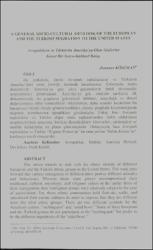A General Socio-Cultural Outlook of the European and the Turkish Migration to the United States
Abstract
Bu makalede, farklı Avrupalı toplulukların ve Türklerin
Amerika’daki etnik kimliği üzerinde durulmuştur. Çalışmada, farklı
dönemlerde Amerika’ya göç eden göçmenlerin farklı davranışlar
sergiledikleri görülmüştür. Amerika’ya göç ettikleri tarihlerin ilk
dönemlerinde, bu grupların geleneksel, kültürel, sosyolojik ve dinsel
değerlerinden ödün vermedikleri irdelenirken, daha sonraki kuşakların bu
hassasiyeti büyük ölçüde gösteremedikleri, önceki gruplarla kıyaslandığında
nispeten asimilasyona uğradıkları görülmüştür. Fakat, bazı Avrupalı
topluluklar ve Türkler diğer etnik topluluklardan farklı olduklarını
sergileyebilmek amacıyla, birlikte düzenledikleri festivalleri, yürüyüşleri ve
mutfak kültürlerini ön plana çıkarmışlardır. Dolayısıyla, bazı Avrupalı
topluluklar ve Türkler “Ergime Potası’na” karışma yerine “Salata Kasesi’ne”
katılmayı tercih etmişlerdir. This article intends to deal with the ethnic identity of different
European and the Turkish ethnic groups in the United States. This study puts
forward that various immigrants of different dates portray different attitudes
and behaviours. Whereas these main groups uncompromised their
traditional, cultural, sociologic, and religious values in the earlier dates of
their immigration, later immigrant groups were relatively subject to the case
of assimilation. Yet, these ethnic communities held festivals, walks, and
introduced their cuisine cultures in order to express that they are different
from the other ethnic groups. There are two different symbols for the
American culture: “melting-pot” and “salad bowl.” Some of these European
and the Turkish groups do not participate in the “melting-pot,” but prefer to
be the different ingredients of the “salad bowl.”
Source
Sosyal Bilimler DergisiVolume
10Issue
3Collections
- Cilt 10 : Sayı 3 [14]



















